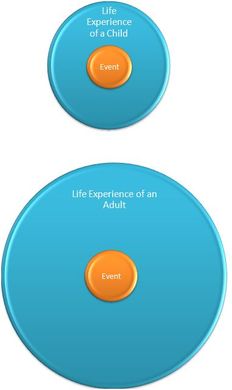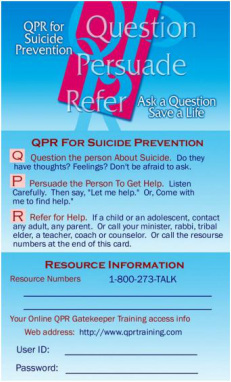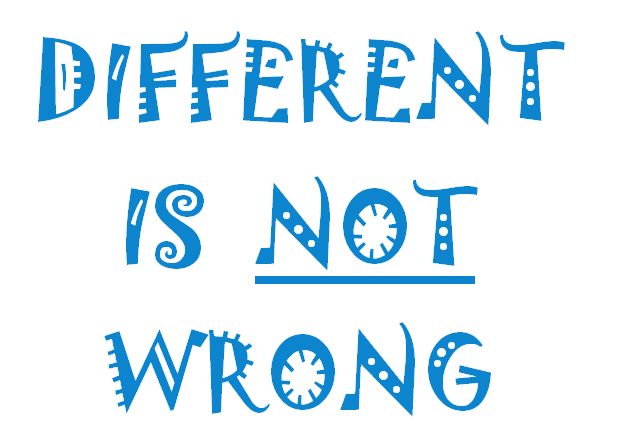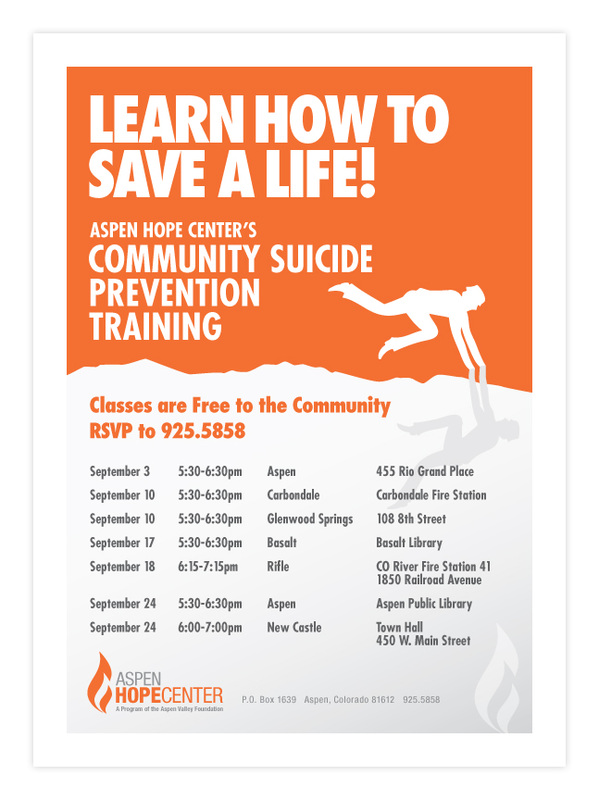|
If you're kid comes home from school and says, "I HATE that kid!" and your reply is, "Don't say hate. That's not nice!" or something similar, you are telling him (or her) the feeling is wrong, not how to more effectively deal with that feeling. So instead try, "That must feel pretty uncomfortable." This is much more validating. Then he gets to learn problem solving skills as you move into helping him find ways to deal with the feeling that IS there.
0 Comments
When you repeatedly threaten your children with consequences for bad behavior and rarely follow through, you are teaching them, repeatedly, that there's a chance they'll get away with the behavior again. If there is always A CHANCE there won't be a consequence, why do what they're is told?
One of the things that couples and family members may struggle with in therapy is the inability to understand that... For instance, lets look at the color of the statement above ("different is not wrong"). One person may have grown up learning that the color above is aqua and another learned to call it turquoise. Is either person wrong? No, just different. Sure, we could potentially go on and on about the accuracy of the color, but in a healthy disagreement we are looking for understanding and acceptance (validation), not necessarily agreement, correct?
So when you're having a disagreement, apply this rule ("Different is not wrong") to your thinking before you seek negotiation. Look for how the other person reached that understanding. How did he/she reach that perspective. How did they arrive at that meaning. Respect that his/her experiences were not wrong, they were just different! Validate. Look for how you can work toward meeting both persons needs for understanding and acceptance, without expecting perspectives to match. Then look for give and take from both sides. If you expect agreement on your perspectives, you could be seeing green before the discussion is over. Dr. John Gottman talks about how all couples have perpetual issues, but movement on those issues is what prevents gridlock. So sometimes the words can be turquoise and another they are aqua, or teal, or blue, or...expect conflict and offer movement. It's completely normal to believe your own children are the best looking, most wonderful, most talented, etc. Couples who attempt to blend a family while behaving in such a manner are doomed to fail. Children want, need, and deserve to be equally important in any family! Work tirelessly to create as much equality and consistency as possible for all children in a blended family...treat every child like your own!
 And here's why... The following is a list of Cognitive Distortions, or THINKING ERRORS. These are the ways of thinking that keep us stuck. Learning how to correct these types of thinking helps us move forward and make forward motion toward our life goals. WHICH ONES DO YOU YOU MOST OFTEN? Aaron Beck first proposed the theory behind cognitive distortions and David Burns was responsible for popularizing it with common names and examples for the distortions. 1. Filtering. We take the negative details and magnify them while filtering out all positive aspects of a situation. For instance, a person may pick out a single, unpleasant detail and dwell on it exclusively so that their vision of reality becomes darkened or distorted. 2. Polarized Thinking (or “Black and White” Thinking). In polarized thinking, things are either “black-or-white.” We have to be perfect or we’re a failure — there is no middle ground. You place people or situations in “either/or” categories, with no shades of gray or allowing for the complexity of most people and situations. If your performance falls short of perfect, you see yourself as a total failure. 3. Overgeneralization. In this cognitive distortion, we come to a general conclusion based on a single incident or a single piece of evidence. If something bad happens only once, we expect it to happen over and over again. A person may see a single, unpleasant event as part of a never-ending pattern of defeat. 4. Jumping to Conclusions. Without individuals saying so, we know what they are feeling and why they act the way they do. In particular, we are able to determine how people are feeling toward us. For example, a person may conclude that someone is reacting negatively toward them but doesn’t actually bother to find out if they are correct. Another example is a person may anticipate that things will turn out badly, and will feel convinced that their prediction is already an established fact. 5. Catastrophizing. We expect disaster to strike, no matter what. This is also referred to as “magnifying or minimizing.” We hear about a problem and use what if questions (e.g., “What if tragedy strikes?” “What if it happens to me?”). For example, a person might exaggerate the importance of insignificant events (such as their mistake, or someone else’s achievement). Or they may inappropriately shrink the magnitude of significant events until they appear tiny (for example, a person’s own desirable qualities or someone else’s imperfections). With practice, you can learn to answer each of these cognitive distortions. 6. Personalization. Personalization is a distortion where a person believes that everything others do or say is some kind of direct, personal reaction to the person. We also compare ourselves to others trying to determine who is smarter, better looking, etc. A person engaging in personalization may also see themselves as the cause of some unhealthy external event that they were not responsible for. For example, “We were late to the dinner party and caused the hostess to overcook the meal. If I had only pushed my husband to leave on time, this wouldn’t have happened.” 7. Control Fallacies. If we feel externally controlled, we see ourselves as helpless a victim of fate. For example, “I can’t help it if the quality of the work is poor, my boss demanded I work overtime on it.” The fallacy of internal control has us assuming responsibility for the pain and happiness of everyone around us. For example, “Why aren’t you happy? Is it because of something I did?” 8. Fallacy of Fairness. We feel resentful because we think we know what is fair, but other people won’t agree with us. As our parents tell us when we’re growing up and something doesn’t go our way, “Life isn’t always fair.” People who go through life applying a measuring ruler against every situation judging its “fairness” will often feel badly and negative because of it. Because life isn’t “fair” — things will not always work out in your favor, even when you think they should. 9. Blaming. We hold other people responsible for our pain, or take the other track and blame ourselves for every problem. For example, “Stop making me feel bad about myself!” Nobody can “make” us feel any particular way — only we have control over our own emotions and emotional reactions. 10. Shoulds. We have a list of ironclad rules about how others and we should behave. People who break the rules make us angry, and we feel guilty when we violate these rules. A person may often believe they are trying to motivate themselves with shoulds and shouldn’ts, as if they have to be punished before they can do anything. For example, “I really should exercise. I shouldn’t be so lazy.” Musts and oughts are also offenders. The emotional consequence is guilt. When a person directs should statements toward others, they often feel anger, frustration and resentment. 11. Emotional Reasoning. We believe that what we feel must be true automatically. If we feel stupid and boring, then we must be stupid and boring. You assume that your unhealthy emotions reflect he way things really are — “I feel it, therefore it must be true.” 12. Fallacy of Change. We expect that other people will change to suit us if we just pressure or cajole them enough. We need to change people because our hopes for happiness seem to depend entirely on them. 13. Global Labeling. We generalize one or two qualities into a negative global judgment. These are extreme forms of generalizing, and are also referred to as “labeling” and “mislabeling.” Instead of describing an error in context of a specific situation, a person will attach an unhealthy label to themselves. For example, they may say, “I’m a loser” in a situation where they failed at a specific task. When someone else’s behavior rubs a person the wrong way, they may attach an unhealthy label to him, such as “He’s a real jerk.” Mislabeling involves describing an event with language that is highly colored and emotionally loaded. For example, instead of saying someone drops her children off at daycare every day, a person who is mislabeling might say that “she abandons her children to strangers.” 14. Always Being Right. We are continually on trial to prove that our opinions and actions are correct. Being wrong is unthinkable and we will go to any length to demonstrate our rightness. For example, “I don’t care how badly arguing with me makes you feel, I’m going to win this argument no matter what because I’m right.” Being right often is more important than the feelings of others around a person who engages in this cognitive distortion, even loved ones. 15. Heaven’s Reward Fallacy. We expect our sacrifice and self-denial to pay off, as if someone is keeping score. We feel bitter when the reward doesn’t come. References: Beck, A. T. (1976). Cognitive therapies and emotional disorders. New York: New American Library. Burns, D. D. (1980). Feeling good: The new mood therapy. New York: New American Library. Ask yourself the following questions: Adapted from Dr. David Olson, University of Minnesota
Since 1973, Dr. John Gottman has studied what he calls the "masters and disasters" of marriage. Ordinary people from the general public took part in long-term studies, and Dr. Gottman learned what makes marriages fail, what makes them succeed, and what can make marriages a source of great meaning. By examining partners’ heart rates, facial expressions, and how they talk about their relationship to each other and to other people, Dr. Gottman is able to predict with more than 90% accuracy which couples will make it, and which will not. What advice does Dr. Gottman have to offer? Below are some of his top suggestions for how to keep your marriage strong.
September is Suicide Prevention Month. Here is a list of Suicide Prevention Trainings (QPR) in our area. PLEASE consider attending one of these 1 hour training sessions. You could save a life! All sessions are FREE and open to the public.
What is QPR? QPR stands for Question, Persuade, and Refer -- 3 simple steps that anyone can learn to help save a life from suicide. Just as people trained in CPR and the Heimlich Maneuver help save thousands of lives each year, people trained in QPR learn how to recognize the warning signs of a suicide crisis and how to question, persuade, and refer someone to help. Each year thousands of Americans, like you, are saying "Yes" to saving the life of a friend, colleague, sibling, or neighbor. Consistency in parenting is one of the most important gifts you can give your children...it teaches them that you are trustworthy.
One of the things I love most about my job is my office...because it is the only place where daily I get to witness lives instantly change for the better. My clients do amazingly hard work and find the successful relationships they always hoped for! People amaze me!
Apologies are not easy...the biggest reason is because by saying "I apologize," means you are admitting to making a mistake. This is a hit to one's self esteem. BUT accountability to crucial to a trusting relationship. If you want to hear more accountability from your partner, be sure to only show appreciation for an apology. Just say, "Thank you" or "I appreciate that." Don't verbally shove the apology back down your partner's throat with an "I told you...." or you are teaching your partner that an apology is too costly a behavior.
By: Kate Scharfff - Psychotherapist, Divorce Expert, Author, Founder of Collaborative Practice Center of Greater Washington
Posted: 05/15/2013 3:24 am http://www.huffingtonpost.com/kate-scharff/cheating-spouse-children_b_3219611.html "I know my boys love their Dad. But he wants to tell them we agreed to divorce. Eventually, they'll see him for the cheating low-life he is. They might as well know now that he destroyed our family." These words were spoken to me, between anguished sobs, by a client -- a grieving wife and mother whose husband had recently left her for another woman. I felt for her; her pain was nearly unbearable. She loved her husband. He had been the center of her life. Suddenly, he was gone and her world had turned upside down. All memories of her husband's positive qualities were eclipsed by devastation and rage. His request that they present the divorce to their children as a mutual decision was too bitter a pill for her to swallow. Whether or not your partner was unfaithful, if he or she has unilaterally chosen to end your relationship, it makes perfect sense that you might want to force him or her to take responsibility for the choice. But before you tell your children that their other parent is the bad guy, let's think this through.
Obviously, there's no one-size-fits-all formula. What you reveal to your kids about infidelity should be informed by such factors as emotional maturity, "sturdiness" of character, security of attachments to loved ones, and (of course) age. A savvy teenager will need the straight scoop -- but will be harmed by a version characterized by bitterness and anger. For now, let's assume your kids are school age or younger. What if your child comes to you with a direct question, such as "Did Mom fall in love with someone else? Is that why you're getting divorced?" Even if the question hits the mark, it doesn't necessarily follow that your ex has been "over-sharing." Remember: Your child is trying to understand the changes in his life. It may be that he does know about the affair (in which case you'll have to deal with the issue head on -- maybe with the input of a child therapist), but it's just as likely that he saw a movie about an unfaithful spouse and is wondering if the theme applies to your family. Until you know what your child knows and what he is truly asking, you won't know how to craft a sensitive answer. The best response to a painfully probing question is an acknowledgment followed by a clarifying question of your own. Try something like "you're trying to make sense of what happened between me and Mom. I'll do my best to answer, but what makes you ask about 'someone else,' honey?" It's inevitable. At some point your child will stump you with a loaded question to which you have no idea how to respond without lying or revealing the too-painful truth. It's fine to tell your child you need time to think. A simple "I'm not sure how to answer your question about whether Dad is going to get married again. But it's an important question, and I want to give you a good answer. Let me talk to Dad about it, and we'll talk to you about it again soon." As unfair as it might feel, I suggest you work with your future ex to share ownership of the decision to separate. A message like "Dad and I have decided we can't be married anymore. We both feel sad about it, but we will always love you and continue to be your parents together" is a good start. The medicine might go down more easily if you remind yourself that these early discussions are only the beginning. For now, while the divorce is new, your children need both parents to deliver the same straightforward, reassuring message. But as they mature through adolescence and into adulthood, your kids' questions and their ability to process your answers will become more nuanced. It will never be ok to bash your ex in the presence of your kids. But when they're older and you're all safely on the other side of this emotional hill, your family story will become more "fleshed out" and your narrative and that of your ex will naturally diverge. It's hard to imagine, but even if you never fully forgive your cheating spouse, your feelings of anger will likely soften over time. It would be tragic if you sent a destructive message now that you couldn't take back later. If it helps, remember: you're not doing this to protect your spouse. You're doing it to protect your kids. Such an important message...we have to rid our world of the perception that seeking help for mental health struggles is a sign of weakness. Seeking help, especially with the stigma that exists in our society, is clearly a sign of strength and a first step in a healthy direction.
The stigma of suicide - The deadly silence surrounding suicide. CNN's Don Lemon, a heartbreaking story and HLN's Dr. Drew. http://www.cnn.com/video/#/video/bestoftv/2013/02/24/nr-lemon-siniff-intv.cnn Are you running out of time being a parent? Consider allowing your children to do more for themselves and your family. It's a concept that really does work...it's often our own guilt as parents that keeps us from teaching our children how to load their clothes into the washer, put them away when clean, or to do a load of dishes. Your child does not have to be a prodigy. Expecting your child to do some work does not make you a bad parent, in fact you're a better parent if you teach them to have a good work ethic from a young age. Just don't expect them to be the Picasso or Mozart of laundry & dishes. Expect imperfections and expect you'll all survive them. Your child's will improve with time and patience!
Do you remember what made you fall in love with your partner? Reminisce and ponder for a moment about the things you love about him/her, especially when you are most irritated by him/her. More often than not you'll find they aren't as bad as they seem.
If you micromanage your loved ones tasks by stating, "do it this way" or "do it that way," you are not only limiting their creativity and problem solving skills but you are likely playing a key role in the way they think about their capabilities. Allow (or force) yourself to sit back and let others make mistakes...after all, there is usually more than one way to finish a task. It's not how you get there, it's that you get there!
Happy observing! Don't be fooled...couples who do not have conflict are not healthier happier couples. Conflict is necessary for couples to negotiate differing perspectives and find neutral ground.
 “Listen earnestly to anything your children want to tell you, no matter what. If you don’t listen eagerly to the little stuff when they are little, they won’t tell you the big stuff when they are big, because to them all of it has always been big stuff.” ~Catherine M. Wallace Life experience plays a huge role in stress management. The more life experience we have the more tools we potentially have available to manage our stressful life events. To a child, who possesses less life experience, stressful events can seem catastrophic; hence the crying, screaming, acting out, and other seemingly irrational behaviors. To a child, those behaviors are not irrational; they are the coping tools they have. Be patient with a child when he or she is stressed and help him/her find and learn effective tools for managing his/her stress.  Someone dies from suicide every 18 minutes! Have you ever wondered what to do when you suspect someone may be feeling suicidal? Do you wonder what to say? What to do? This suicide prevention training is one I recommend for EVERYONE! It's online, it only takes an hour, and it's very inexpensive ($19.95 minus if you use promo code QPRO). This should become as common as CPR as it can save just as many, if not more lives! I attached the wallet card as a summary of what this intervention requires...and if nothing else, print the card and keep it with you. It can help YOU save a life! Suicide is the most preventable death! http://www.qprinstitute.com/gatekeeperonline.html Some individuals feel the most stress when they are driving; trying to get to the next destination quickly, risking life and limb to get there on time, feeling their heart race, birds (fingers) flying, and curse words boiling their tongues. But did you know that if you speed up by 10 mph on a 10 mile trip (from 65 mph to 75 mph), you will only get there 1 minute and 15 seconds faster?! That's actually enough time to finish a song, complete a mental list, call a family member and say "I love you!" (hands free of course), or just enjoy some silence. It can actually reduce your level of stress to save that 75 seconds for yourself! It's not usually, if at all, worth all the aggression.
Innovative Approach to Men’s Mental Health
Campaign Uses Humor to Help Men Tackle Depression, Divorce and Suicidal Thoughts Mike Lee PR & Social Media Director, Cactus [email protected] | 303.455.7545 Denver, July 11, 2012 – Man Therapy, a groundbreaking new approach to suicide prevention and other men’s mental health issues, was launched in Colorado today. Man Therapy (TM) reshapes the conversation, using humor to cut through stigma and tackle issues like depression, divorce and even suicidal thoughts head on, the way a man would do it… “Colorado currently has the 6th highest suicide rate in the nation,” notes Jarrod Hindman, director of Colorado’s Office of Suicide Prevention. “Men between the ages of 25 and 54 represent a significant portion of suicide deaths in the state, and the numbers are on the rise. It is clear that we have to do something to target this difficult to reach audience.” The purpose of the Man Therapy campaign is to provide men approaching crisis, and their loved ones, a place to go and learn more about men’s mental health, examine their own and consider a wide array of actions that will put them on the path to treatment and recovery. The message is that all men should be aware of their mental health, treat it like they would a broken leg and strive to get better. “Man Therapy features our hero, the good Dr. Rich Mahogany. He’s a man’s man who is dedicated to cutting through the denial with a fresh approach using his rapier wit, odd sense of humor, no bullshit approach and practical advice for men,” said Joe Conrad, Cactus founder and strategic director. “There exists an age-old stigma that says mental health disorders are unmanly signs of weakness. And our main character and hero, Dr. Rich Mahogany, is dedicated to smashing that.” The centerpiece of the campaign is the mantherapy.org website, where men and their loved ones will find they have a virtual appointment with Dr. Mahogany. He greets visitors, makes them feel at ease and then provides an overview of what they will find and explore during their visit… Read more... |
Mary Bowles, PsyD, abd, LMFTMy blog posts are just some of the bits of information I find useful for some or all of my clients. Archives
December 2021
|






 RSS Feed
RSS Feed